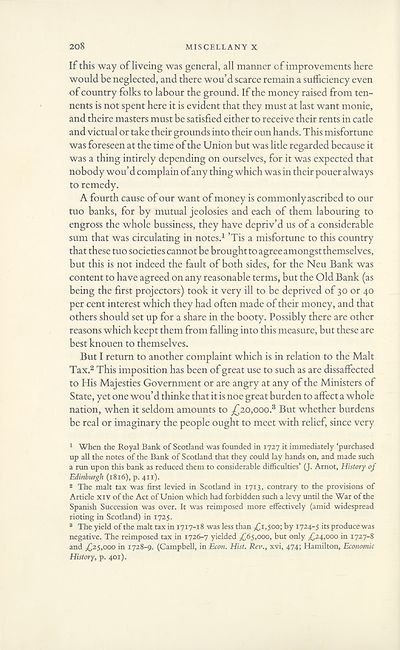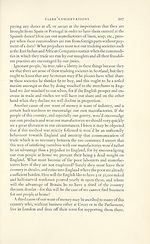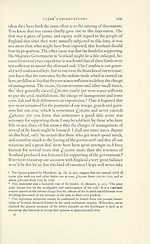Series 4 > Miscellany of the Scottish History Society
(233) Page 208
Download files
Complete book:
Individual page:
Thumbnail gallery: Grid view | List view

208
MISCELLANY X
If this way of liveing was general, all manner of improvements here
would be neglected, and there wou’d scarce remain a sufficiency even
of country folks to labour the ground. If the money raised from ten-
nents is not spent here it is evident that they must at last want monie,
and theire masters must be satisfied either to receive their rents in catle
and victual or take their grounds into their oun hands. This misfortune
was foreseen at the time of the Union but was litle regarded because it
was a thing intirely depending on ourselves, for it was expected that
nobody wou’d complain of any thing which was in their pouer always
to remedy.
A fourth cause of our want of money is commonly ascribed to our
tuo banks, for by mutual jeolosies and each of them labouring to
engross the whole bussiness, they have depriv’d us of a considerable
sum that was circulating in notes.1 ’Tis a misfortune to this country
that these tuo societies cannot be brought to agree amongst themselves,
but this is not indeed the fault of both sides, for the Neu Bank was
content to have agreed on any reasonable terms, but the Old Bank (as
being the first projectors) took it very ill to be deprived of 30 or 40
per cent interest which they had often made of their money, and that
others should set up for a share in the booty. Possibly there are other
reasons which keept them from falling into this measure, but these are
best knouen to themselves.
But I return to another complaint which is in relation to the Malt
Tax.2 This imposition has been of great use to such as are dissaffected
to His Majesties Government or are angry at any of the Ministers of
State, yet one wou’d thinke that it is noe great burden to affect a whole
nation, when it seldom amounts to -£20,ooo.3 But whether burdens
be real or imaginary the people ought to meet with relief, since very
1 When the Royal Bank of Scotland was founded in 1727 it immediately ‘purchased
up all the notes of the Bank of Scotland that they could lay hands on, and made such
a run upon this bank as reduced them to considerable difficulties’ (J. Arnot, History of
Edinburgh (1816), p. 411).
2 The malt tax was first levied in Scotland in 1713, contrary to the provisions of
Article xiv of the Act of Union which had forbidden such a levy until the War of the
Spanish Succession was over. It was reimposed more effectively (amid widespread
rioting in Scotland) in 1725.
3 The yield of the malt tax in 1717-18 was less than £1,500; by 1724-5 its produce was
negative. The reimposed tax in 1726-7 yielded £65,000, but only £24,000 in 1727-8
and £25,000 in 1728-9. (Campbell, in Eton. Hist. Rev., xvi, 474; Hamilton, Economic
History, p. 401).
MISCELLANY X
If this way of liveing was general, all manner of improvements here
would be neglected, and there wou’d scarce remain a sufficiency even
of country folks to labour the ground. If the money raised from ten-
nents is not spent here it is evident that they must at last want monie,
and theire masters must be satisfied either to receive their rents in catle
and victual or take their grounds into their oun hands. This misfortune
was foreseen at the time of the Union but was litle regarded because it
was a thing intirely depending on ourselves, for it was expected that
nobody wou’d complain of any thing which was in their pouer always
to remedy.
A fourth cause of our want of money is commonly ascribed to our
tuo banks, for by mutual jeolosies and each of them labouring to
engross the whole bussiness, they have depriv’d us of a considerable
sum that was circulating in notes.1 ’Tis a misfortune to this country
that these tuo societies cannot be brought to agree amongst themselves,
but this is not indeed the fault of both sides, for the Neu Bank was
content to have agreed on any reasonable terms, but the Old Bank (as
being the first projectors) took it very ill to be deprived of 30 or 40
per cent interest which they had often made of their money, and that
others should set up for a share in the booty. Possibly there are other
reasons which keept them from falling into this measure, but these are
best knouen to themselves.
But I return to another complaint which is in relation to the Malt
Tax.2 This imposition has been of great use to such as are dissaffected
to His Majesties Government or are angry at any of the Ministers of
State, yet one wou’d thinke that it is noe great burden to affect a whole
nation, when it seldom amounts to -£20,ooo.3 But whether burdens
be real or imaginary the people ought to meet with relief, since very
1 When the Royal Bank of Scotland was founded in 1727 it immediately ‘purchased
up all the notes of the Bank of Scotland that they could lay hands on, and made such
a run upon this bank as reduced them to considerable difficulties’ (J. Arnot, History of
Edinburgh (1816), p. 411).
2 The malt tax was first levied in Scotland in 1713, contrary to the provisions of
Article xiv of the Act of Union which had forbidden such a levy until the War of the
Spanish Succession was over. It was reimposed more effectively (amid widespread
rioting in Scotland) in 1725.
3 The yield of the malt tax in 1717-18 was less than £1,500; by 1724-5 its produce was
negative. The reimposed tax in 1726-7 yielded £65,000, but only £24,000 in 1727-8
and £25,000 in 1728-9. (Campbell, in Eton. Hist. Rev., xvi, 474; Hamilton, Economic
History, p. 401).
Set display mode to:
![]() Universal Viewer |
Universal Viewer | ![]() Mirador |
Large image | Transcription
Mirador |
Large image | Transcription
Images and transcriptions on this page, including medium image downloads, may be used under the Creative Commons Attribution 4.0 International Licence unless otherwise stated. ![]()
| Scottish History Society volumes > Series 4 > Miscellany of the Scottish History Society > (233) Page 208 |
|---|
| Permanent URL | https://digital.nls.uk/126695679 |
|---|
| Description | Over 180 volumes, published by the Scottish History Society, containing original sources on Scotland's history and people. With a wide range of subjects, the books collectively cover all periods from the 12th to 20th centuries, and reflect changing trends in Scottish history. Sources are accompanied by scholarly interpretation, references and bibliographies. Volumes are usually published annually, and more digitised volumes will be added as they become available. |
|---|


